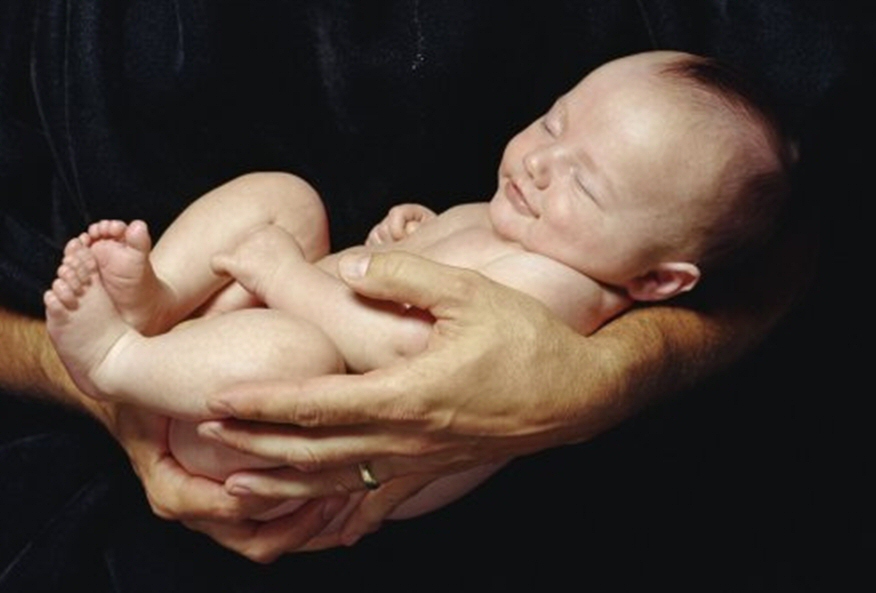Entries in Christmas (23)
How God Sneaks In
 Thursday, November 5, 2015 at 10:50AM
Thursday, November 5, 2015 at 10:50AM  Honestly, who’s going to lock God out of their building?
Honestly, who’s going to lock God out of their building?
God will sneak in anywhere. He’s eager to meet gentle and humble spirits, even if the gatekeepers try to keep him away. He’ll do anything to connect with the pure in heart: he’s been smuggled into the building wrapped in a baby-blanket, carried by a first-time mother. He wanted to meet two such hearts long ago. Do you remember their story?
Simeon and Anna were on the fringe of life in the temple. (You can find this account in Luke, chapter 2.) They were two harmless old people who held no religious office, had no power, and most likely had very little respect from the people in charge. This temple, the religious center of Judaism, was megachurch-big and just as busy. Who took time to notice a couple of slow-moving white-haired folks on the sidelines? God. God did.
Simeon had a secret, and his secret was so powerful it was keeping him alive. Simeon had been promised that he wouldn’t die until he had seen the “consolation of Israel.” Most people would have thought he was crazy: do you know how long Jewish people had been waiting for a Messiah? Decades. Centuries. Their country was overrun with Romans, and before that the Greeks had been in charge. Religious leaders had led failed uprisings and dashed the hopes of people for at least two hundred years. But Simeon was “righteous and devout,” a man dedicated to God and sensitive to the Holy Spirit. God told Simeon he would not die without seeing the promise.
Anna had eyes to see and ears to hear—even if she did work in the nursery. She was very old, and had been without her husband for decades. What religious system—run by men—would take any notice of a powerless widow, even if she held a title of “prophet”? Anna heard the voice of God amidst the busy-ness and din of the worship industry. The Spirit led her to that place where Simeon’s promise was fulfilled, and she saw him worshipping the Baby God. It was her turn; she took the child in her arms. That’s what a lifetime of prayer, fasting, and waiting will do: you see things other people miss. Anna, the prophet, was willing to tell anyone who would listen, but who listens to 84 year-old widows?
It turns out that Simeon and Anna are still speaking. They tell us that even in a corrupt religious system, people of purity can thrive and connect with God. Thirty years before Jesus began to preach in Galilee he was already connecting with people like Simeon and Anna, because God gives grace to the humble. It’s what he always does: he had already invited nameless shepherds and pagan astrologers to visit the divine delivery room of the child Christ. Now, eight days later, God whispered his secrets again, this time right in the Temple!
He has never stopped. Jesus made a big splash when he returned to the Temple years later. He invited people to drink deep of the Spirit. Later he made a whip and invited the greedy to leave. When the religious leaders finally took notice of Jesus, they plotted ways to keep him out. The chief priest even justified the thought of murder by saying it was better for one man to die for the sake of the nation. (If he only knew what he was saying.) The religious big shots tried their best: when they crucified his body, he returned in Spirit. When they got rid of the Rabbi, he came back through his disciples. God will never stop reaching out to those who hunger and thirst for righteousness. They will be filled.
There’s just one application from all this: let’s not waste our time blaming the system. Religious systems (like all systems) are flawed. But God finds a way to become present with his people. We can spend time criticizing the flaws and denouncing hypocrisy, or we become like Simeon and Anna, to whom God keeps his promise, as he always does.
Start Christmas with a Thanksgiving Gift
 Thursday, November 20, 2014 at 03:17PM
Thursday, November 20, 2014 at 03:17PM  At last: A Christmas devotional for incredibly busy people.
At last: A Christmas devotional for incredibly busy people.
Each December day until Christmas, in one minute or less, you can capture inspiration that will enrich your journey toward Christmas day. Everyone's busy—and the holidays only add to the list of things to do. Yet Christmas is something more than a celebrated ancient ritual or a modern holiday centered on shopping.
God is still speaking through the Christmas story: the gospel narratives of Jesus’ birth are filled with encouragement and revelation: they proclaim the love of God and his wisdom for us today.
The practical eBook format means you can catch a devotional moment on the go: from your e-Reader, at your desktop, holding your tablet, or on your phone. If you can create enough space to read these one-minute devotions, you can carry their thoughts and ideas with you the rest of the day. Best of all, it's just ¢99: Available for Amazon Kindle and Kindle Apps.
The paperback format is for bedside, fireside, or children-by-your-side reading. It’s also something novel—a Thanksgiving gift: imagine walking into your Thanksgiving meal and giving your host a Christmas gift. Or (if you are the Thanksgiving host) imagine your table with this devotional at each place setting. No one will forget the year they received a Thanksgiving gift. Available at Amazon.com.
Here’s a sample of the devotional:
From the Life of Joseph:
DAY TWELVE
Because Joseph her husband was a righteous man and did not want to expose her to public disgrace, he had in mind to divorce her quietly. (Matthew 1:19)
The narrative shows us what a righteous man looks like. In his confusion and pain, Joseph’s first concern was for Mary. How many of us would have this priority? Perhaps this is why the scripture labels him a “righteous man.” Joseph's righteousness is rendered not in terms of his relationship to God, but in terms of his relationship to Mary. True righteousness extends two directions—toward God and toward others.
How to Pay Your Christmas Bills
 Friday, December 27, 2013 at 08:48AM
Friday, December 27, 2013 at 08:48AM  Christmas has come and gone. I am in debt so deeply I have no hope of paying back what I owe, but this debt brings me hope and joy. I am in debt to God’s great Incarnational act of love.
Christmas has come and gone. I am in debt so deeply I have no hope of paying back what I owe, but this debt brings me hope and joy. I am in debt to God’s great Incarnational act of love.
Hidden in the North American holiday habit of excess and over-spending is a parable. The bank of Heaven extended me a line of credit so vast it cannot be calculated, and I drew on every bit of the amount. Our great debt to God is love. And like all great debt, the only way to pay it back is a little at a time, each payment a reminder of the grand total.
To stretch this simple metaphor to its ultimate degree, the Bank of Heaven has many locations, currently approaching seven billion on the planet: since all humanity is made in his image, everyone becomes a location where I can present an installment on so happy a debt.
If you have been taught that the only meaning of grace is free-forgiveness you will certainly take issue with this line of thinking. “That’s what grace is all about,” you protest, “we cannot pay the debt of sin, nor should we imagine we could ever earn our way to heaven.” In our day this particular truth is too true, yet I am not talking about sin. I am talking about something as different from sin as water is from sand. I am talking about the Father’s love. If Christmas were only about divine rescue from sin, then the sin-debt—paid in full—would be the end of the issue. When we understand that Christmas is not about our sin but rather God’s great love, we will see what we received at Christmas was an advance upon the love of God.
The economics of the Incarnation turn every business model on its head: “For you know the grace of our Lord Jesus Christ, that though he was rich, yet for your sake he became poor, so that you by his poverty might become rich.” The prudent Apostle Paul warned against the worldly debt but encouraged the debt of love: “Owe no one anything, except to love each other.” The love of God is the currency of Heaven, the coin of our payment to one another.
His genius is not compounding interest, but compounding equity. We repay the love debt with the very substance of the original act of God’s great love. All across the world, the love of God is repaid in acts of kindness done in his name. The effect is ever-increasing love, the source—and the payment—of our joyous debt.
The Commoner King
 Friday, December 20, 2013 at 10:47AM
Friday, December 20, 2013 at 10:47AM  Some things hide in plain sight. Others hide behind fancy names. And still others hide among the over-decorated trappings of tradition dressed up as garish holiday cheer. Sometimes it’s all three.
Some things hide in plain sight. Others hide behind fancy names. And still others hide among the over-decorated trappings of tradition dressed up as garish holiday cheer. Sometimes it’s all three.
The truth about Christmas is that God became a man. The transcendent Creator of the Universe, the One who sits outside his creation submerged himself in the work of his hands. The Playwright walked on stage in the middle of the show. The Coach became a player. The King became a commoner.
He wasn’t a Poser, pretending to be something other than what he was: he was born, and he grew; he came of age and took his place among us; he embraced his purpose and fulfilled it completely. He wasn’t slumming among us like some impostor: he laughed, he cried, he sweat. When we struck him, he bled. When we pierced him, he died.
Something as grand and wonderful as Christmas certainly has many sub-themes: peace on earth, goodwill toward men, hope for tomorrow, salvation for all, and the fulfillment of promise. We should listen to each line of the symphony and enjoy the beauty of each one. Put them all together than they point to the grand melody, that God became man.
When God became man, he demonstrated how to be human. His life, in the person of Jesus Christ, is the model of all lives, everywhere and in every time. Men from every age can look to Jesus has example. Women from every culture can discover fullness in him. God did not cheat the game by walking through life untouched by the trouble we face. He faced the same troubles we have faced, and indeed more, because to his trouble was added unique rejection of all mankind toward him. Humanity had never seen his type before, and the one encounter between God and humanity resulted in our utter rejection of him, but he responded with un-rejectable love.
You can have your shepherds, wise men, angels, and mangers. For me, the grandeur of Christmas is captured in the gospel, which places its cards on the table right from the start:
The true light that gives light to everyone was coming into the world. He was in the world, and though the world was made through him, the world did not recognize him. He came to that which was his own, but his own did not receive him. Yet to all who did receive him, to those who believed in his name, he gave the right to become children of God— children born not of natural descent, nor of human decision or a husband’s will, but born of God. The Word became flesh and made his dwelling among us. We have seen his glory, the glory of the one and only Son, who came from the Father, full of grace and truth. (John 1:9-14)
John tells us plainly, “No one has ever seen God, but the one and only Son, who is himself God and is in closest relationship with the Father, has made him known.” (John 1: 18)
What does God look like? He looks like Jesus. The Father spoke himself in Jesus. The countless words of every generation, arrayed in questions, arguments, songs and poems have been answered in the single Word, Jesus. The same Word that spoke creation into being speaks life into us today.
When God became man, it looked like Jesus, and he still does. If we aspire to the presence of God in our everyday, we are really aspiring to Jesus. Because he is human we have the hope of his likeness. Because he is God, we have the certainty of his promise. All other messages flow from the Word made flesh. He was announced as Emmanuel, and he continues to reveal himself as such: God is forever with us because he has forever pitched his tent in the person of Jesus, the true lesson of Christmas.
Always Christmas, Never Winter
 Thursday, December 27, 2012 at 09:28AM
Thursday, December 27, 2012 at 09:28AM  Wednesday night, the evening after Christmas, our little girl laid by the fire and said, “Christmas goes too quickly.” I smiled a grown-up smile--the kind tinged with sadness--because I knew work was already calling. The world continued to turn. The business of life demanded my attention again. Our Christmas pause (happy as it was) was over. Already that night I had checked email twice, looking to get a jump on the work day ahead.
Wednesday night, the evening after Christmas, our little girl laid by the fire and said, “Christmas goes too quickly.” I smiled a grown-up smile--the kind tinged with sadness--because I knew work was already calling. The world continued to turn. The business of life demanded my attention again. Our Christmas pause (happy as it was) was over. Already that night I had checked email twice, looking to get a jump on the work day ahead.
Yet in that moment by the fire the true wisdom came from our daughter’s heart. Christmas was over too soon, and only a fool would not pause to lament its passing.
Here’s an exercise: imagine the happiest ending to any story ever told. Don’t hold back. Dream of something impossibly good. Infuse “happily ever after” with every practical joy you know. Now double it. If it doesn’t feel too foolish, write down the crazy joy and keep it stored in your phone so you can see it every time it comes to mind.
It’s a righteous exercise, the discipline of a mind engaged with the goodness of God. The surprising reality is that the New Testament urges us time and again to indulge ourselves with speculations of delight. The Apostle Paul concludes his prayer for others with, “to him who is able to do immeasurably more than all we ask or imagine.” Peter comforts a suffering minority with the phrase “Joy unspeakable, full of glory.” Reframing Isaiah, Paul exhorts reminds us neither can our eyes see, nor our ears hear--no, never could it enter into our hearts--all that God has planned for us.
Time and again he invites us to exercise our imagination toward his goodness and our destiny, because he cares for us. His care is complete. His goodness is without end. Love guides his immeasurable power. Our childish view of life with God does not contain too many pictures of delight, but too few--and too small.
Centuries later C.S. Lewis added his take: “You and I have need of the strongest spell that can be found to wake us from the evil enchantment of worldliness which has been us for nearly a hundred years.” Wordsworth chided us: “We have given our hearts away.” His powerful poem opens with the simple observation, “The world is too much with us, late and soon/ Getting and spending, we lay waste our powers.”
Better to live in the lament of Christmas gone too soon than to face grimly the “reality” of a workaday world. Better still--what if we discovered the path to unspeakable joy in the everyday business of life. What if Father Christmas has gifts to give us each and every day?

